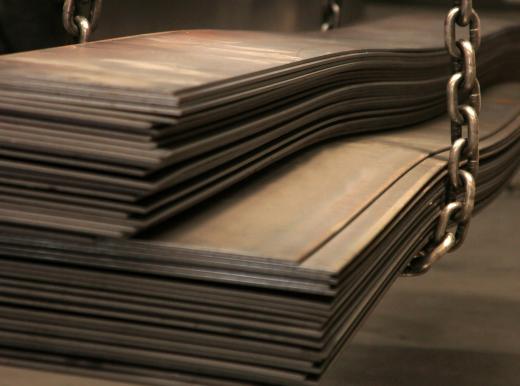A sheet metal brake is a tool used to create bends or folds in a piece of sheet metal. They range from small units used by hobbyists or do-it-yourself (DIY) homeowners, to very large and powerful units used by builders and machine shops. Each sheet metal brake should be carefully selected to meet the demands of a particular metalworking project. This includes choosing a brake that's large enough to accommodate a given piece of metal, and strong enough to create clean and sharp bends or folds.
The standard sheet metal brake consists of three basic components. Users place the sheet metal on a flat surface known as the bed. A second plate sits parallel to the bed, and is used to clamp the metal in place during the bending process. A bending plate or bar sits along the edge of the bed, and is attached to the bed using a series of hinges. As the user operates the press, the bending plate hinges up and bends the metal sheet that is clamped between the bed and clamp plate.

Metalworkers and manufacturing facilities can choose from three basic types of sheet metal brake designs. Bar brakes are the most basic of these units, and consist of a simplified mechanism that clamps and bends the entire sheet of metal all in one motion. Cornice models are equipped to make a single straight bend only, and can only be used to bend an entire length of material at once. Box and pan units allow users to make multiple bends or folds in a single sheet of metal. They include a series of plates and blocks that enable operators to bend only a portion of each sheet as needed, leaving other sections unaltered.
Hobbyists and home users may choose a simple tabletop model. These smaller units feature manual operation, and are designed to bend lightweight steel, copper or aluminum. Floor models sit on the floor in a shop or factory, and can be used to bend heavier materials. For the most heavy-duty applications, a hydraulic sheet metal brake, or press brake relies on hydraulics to quickly and easily bend large pieces of metal.
A sheet metal brake can be used for a variety of different bending applications. In a sheet metal shop, it's often used to fold heating and cooling ducts or machine casing components. On a job site or in the field, the sheet metal brake serves as an effective method of bending metal flashing or gutters for a home repair project.
